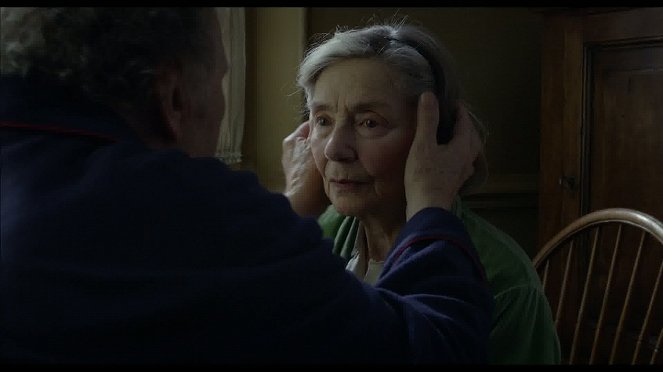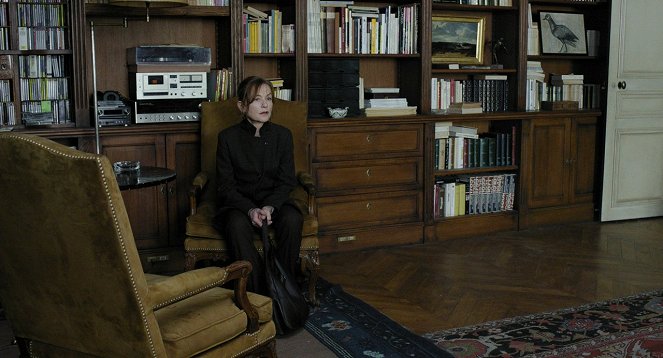Regie:
Michael HanekeDrehbuch:
Michael HanekeKamera:
Darius KhondjiBesetzung:
Jean-Louis Trintignant, Emmanuelle Riva, Isabelle Huppert, William Shimell, Ramón Agirre, Rita Blanco, Carole Franck, Dinara Drukarova (mehr)Inhalte(1)
Georg und Anna sind um die 80, kultivierte Musikprofessoren im Ruhestand. Die Tochter, ebenfalls Musikerin, lebt mit ihrer Familie im Ausland. Eines Tages erleidet Anna einen Schlaganfall. Eine Operation schlägt fehl. Als sie aus dem Krankenhaus nach Hause kommt, ist sie halbseitig gelähmt. Es beginnt eine Bewährungsprobe für die Liebe des alten Paares. (ORF)
(mehr)Videos (5)
Kritiken (7)
Eine große Enttäuschung: ein expliziter, gekünstelt wirkender, vom Ton her snobistischer und meiner Meinung nach ein völlig lebloser Film, aus dem nichts als jenes Klassische das "Leben ist schön, der Tod ist schmerzhaft" emporgeht. Einige wortwörtliche Szenen überraschen mich im Falle eines Filmemachers der Kategorie Hanekes mit ihrer billig anmutenden Dringlichkeit (die meisten Szenen mit Ideen und Träumen), die Figur Isabelle Hupperts mutet hier sehr gewaltsam hineinkomponiert an und je mehr im Film über den Tod gesprochen wurde, desto weniger lebhaft kam mir das Thema vor (haha, diese Paradoxe). In einigen Momenten verwandelte sich nämlich der einst kompromisslose Analytiker Haneke schlichtweg in einen konventionellen Midcultanhänger, der einem schmerzhaften Thema auf einfachste Art und Weise entkommt (eine von einer "starren" romantischen Malerei gefolgte Ohrfeige usw.). Die einzige wirklich hineinsaugende Szene war meines Erachtens diejenige, als der Regisseur das Publikum hat in einer vielköpfiger Schaar nach Helden suchen und halb in ambivalenten Emotionen ertrinken lassen. Und danach gab´s alles kostenlos. Das passt mir nicht. Obwohl ich zugebe, dass es kultiviert, elegant gedreht und präzise gespielt worden ist.
()
So eine Fürsorge bei einer Frau, mit der ich das Leben verbracht habe, ist selbstverständlich. Und so eine Einstellung zu ihrem Verlassen dieser Welt ist nicht schockierend. Warum muss man also darüber einen akademisch kalten Film drehen, der absichtlich Emotionen und eine Vertiefung der Geschichte durch Flashbacks oder Nebenfiguren meidet? Wenn das Bild nicht minimalistisch wäre, würde ich darin Haneke nicht erkennen. Diesmal war aber sein Minimalismus selbstzweckmäßig, es handelte sich nicht um einen Teil von einer scharfsinnigen Autoren-Absicht. Ein fader, leerer Pseudo-Arthouse-Film.
()
Love as certainty. Love as commitment. Love as a prison. The many forms of emotion that life gives and destroys inspired Haneke to make a film that begins with a death and continues with a precise study of subjugation and the maintaining of control, without sentimentality, but not entirely coldly either. After Anne becomes paralysed, the film remains in the space of a single apartment, which we leave together with Georges only in a dream, as liberating as listening to music, the noblest of the arts. A few rooms become the couple’s new world, a miniaturised version of the world outside. They have reached an age and situation when they no longer need or want each other. Even if at the cost of complete isolation from their surroundings (the intentionally unexplained dismissal of the caregiver leaves us in doubt as to whether it was really her or if Georges simply cannot bear having anyone else between himself and his wife). The unusually long shots show all of the pain of old age without haste and without pauses provided through editing, while also drawing our attention to the slow passage of time. Nothing is momentary; every action lingers. Love as patience. Amour is a focused work of a filmmaker who trusts the talent of his actors and the perceptiveness of his viewers. Though the film carries within itself at least as many themes as love has forms (the younger generation’s perspective represented by the daughter is very inspiring), what I consider to be the most important thing in our current age of half-hearted long-distance relationships is the fact that someone has made a film about true love, whose purity is to a large extent dependent on spatial proximity. Behind what some may see as stale academic art, I believe there is hidden a topical and very urgent challenge. Should we give up love out of fear of possible pain? 80%
()
The materialized fear of all aging couples. Haneke goes straight to the heart of the matter, limiting his determined but meaningless shots to a minimum and cutting to the bone after just a few minutes. However, he cuts relentlessly until the end. Although love fascinated me by its ability to reach the depths of the soul, because it does not become the climax of the film - but eventually a stagnant routine - the experience is only half complete.
()
If, for example, Haneke's The White Ribbon felt disturbing and extraordinarily impressive to me, Amour represents the opposite pole of his work. It seems strongly predictable, aloof, and unnecessarily literal for my taste. True, contemporary society tends to repress unpleasant phenomena - and first and foremost among them are dying, powerlessness, and the act of death itself. If you belong to this large group, the film can reveal something to you. But a simple demonstration is not enough for me. I have already dealt with all of this in the past and I do not find film magic in Haneke's film. The director serves me something that is already finished and I do not see any room for myself in there. Not to mention the fact that it's as cold as ice. I'm giving it three stars for Haneke's undoubtedly high-quality craftsmanship. Overall impression: 55%.
()



Werbung